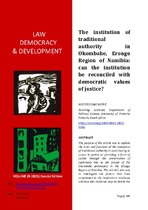| dc.contributor.author | More, Madikgomo | |
| dc.date.accessioned | 2022-02-11T12:56:54Z | |
| dc.date.available | 2022-02-11T12:56:54Z | |
| dc.date.issued | 2021 | |
| dc.identifier.citation | More, M. (2021). The institution of traditional authority in Okombahe, Erongo Region of Namibia: can the institution be reconciled with democratic values of justice?. Law democr. Dev. 25 spe. http://dx.doi.org/10.17159/2077-4907/2020/ldd.v25.spe7. | en_US |
| dc.identifier.uri | http://dx.doi.org/10.17159/2077-4907/2020/ldd.v25.spe7 | |
| dc.identifier.uri | http://hdl.handle.net/10566/7230 | |
| dc.description.abstract | The purpose of the article was to explore the roles and functions of the institution of traditional authority in contributing to access to justice or providing a form of justice through the preservation of customary law to the people of the Okombahe community in the Erongo Region of Namibia. The article's aim was to investigate the factors that have contributed to the institution's resilience and how this resilience may be tied to the type of justice this customary institution provides and represents. The institution of traditional authority has recently caught the attention of both scholars and policymakers due to the increasing return or revival of this "ancient" form of governance in the contemporary era that is constantly changing its procedures and rules of appointment to adapt to contemporary concerns and social problems. The scope of traditional leaders' jurisdiction and power is defined in the roles and functions they fulfil. As a popular legitimate informal institution in Okombahe, traditional leaders were found to manage and resolve conflict, and to preserve communal identity, unity, and continuity. This article highlights the significance of the institution of traditional authority as a legitimate customary institution originating from the bottom-up, and as a system that can be complementary to democracy as opposed to the assumption sometimes held that it is contesting with it. In Okombahe, the institution of traditional authority was found to contribute to providing an accessible justice system option grounded in this community's identity, history and social norms. The data collection employed for this qualitative case study of Okombahe consisted of interviews, supporting documents, and relevant scientific articles. | en_US |
| dc.language.iso | en | en_US |
| dc.subject | Customary law | en_US |
| dc.subject | The institution of traditional authority | en_US |
| dc.subject | Namibia | en_US |
| dc.subject | Resilience | en_US |
| dc.title | The institution of traditional authority in Okombahe, Erongo Region of Namibia: can the institution be reconciled with democratic values of justice? | en_US |
| dc.type | Article | en_US |

